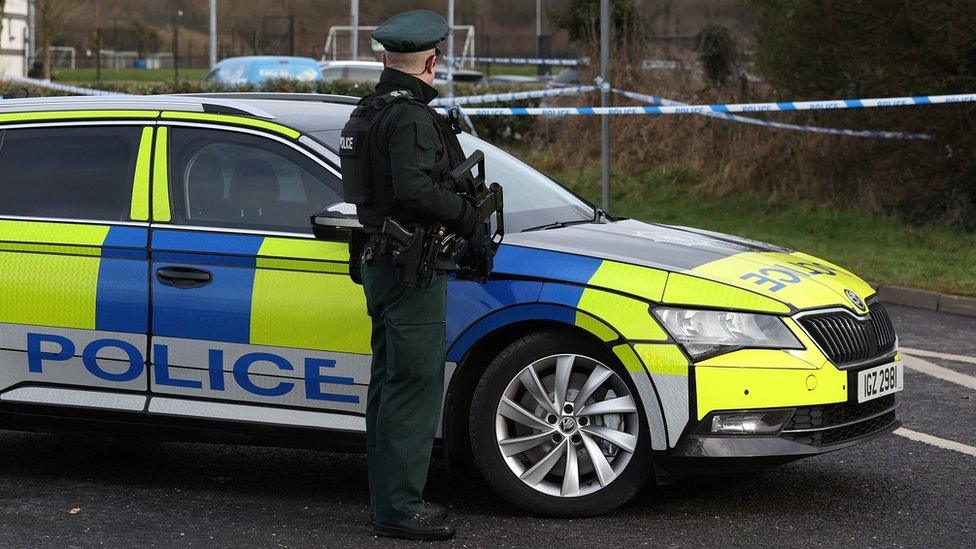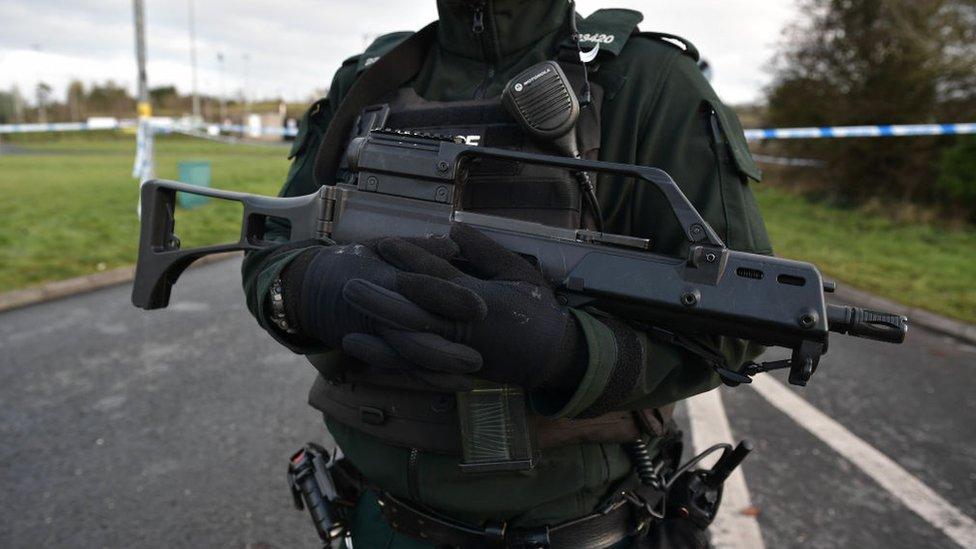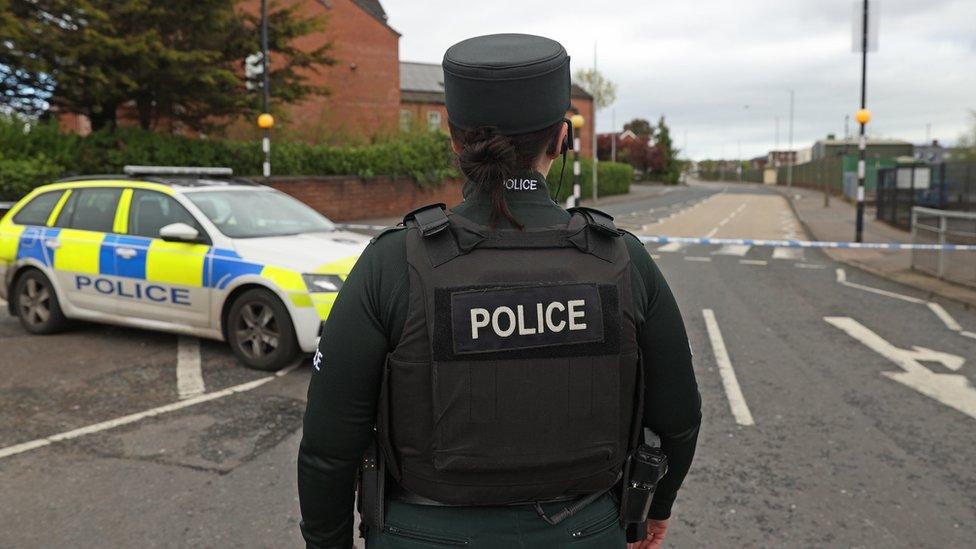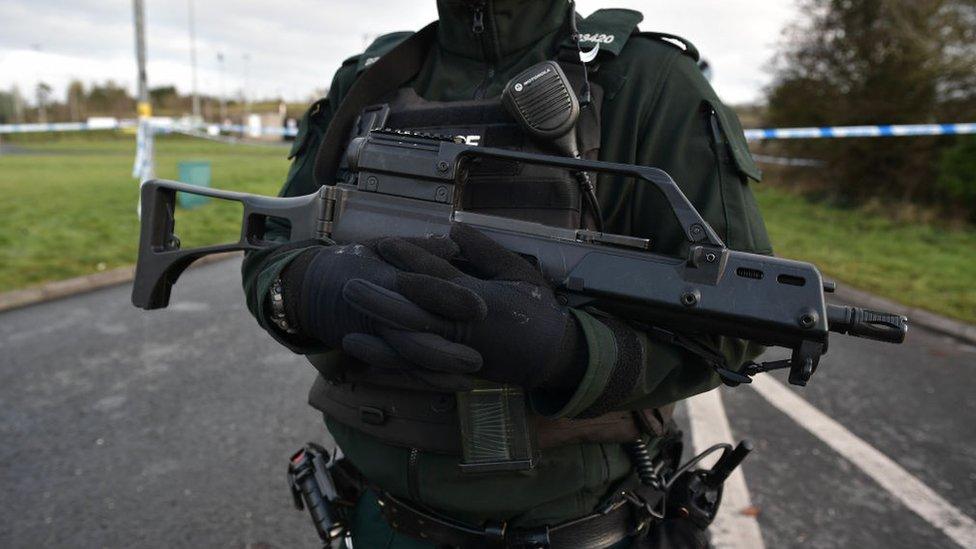PSNI data: Police investigate second breach after documents stolen
- Published

Details of a second data breach within the Police Service of Northern Ireland have emerged less than 24 hours after a "monumental" leak of staff information.
Confirmation of the theft in July of a spreadsheet with names of 200 officers and staff emerged on Wednesday.
Police officers and staff had already been given updated security advice after the accidental publication of personal details on the internet.
The names and roles of 10,000 officers and staff were published on Tuesday.
The information released in the first data breach was accidentally included in a response to a freedom of information (FoI) request.
It appeared on the internet for a few hours but was later taken down.
Revealing details of the second breach, Assistant Chief Constable Chris Todd said documents, along with a police issue laptop and radio, were believed to have been stolen from a private vehicle in the Newtownabbey area of County Antrim on 6 July.
The officers and staff concerned have been made aware of the incident.
The Police Federation of Northern Ireland, which represents PSNI officers' interests, has been "inundated with calls from worried officers," according to its chair, Liam Kelly.
"The major security breach was bad enough, but this heaps further additional pressure on the PSNI to produce credible explanations around data security protocols and the impact on officer safety," he said.
'Extremely serious situation'
The PSNI had previously said it was treating the release in the first breach as a critical incident and that an emergency threat assessment group had been established.
The information released included the surname and first initial of every employee, their rank or grade, where they are based and the unit they work in, including sensitive areas such as surveillance and intelligence.
"This is an extremely serious situation," said ACC Todd.
"We fully understand the very real concerns being felt by our colleagues and their families and we are working hard to do everything we can to mitigate any risk.
"As well as general advice on safety and security this multi-disciplinary group will focus on immediate support to those with specific circumstances which they believe place them or their families at immediate risk or increased threat of harm."
In the past, heightened security advice has included checking vehicles for under-car explosive devices and frequently changing routes taken to and from home.
More than 300 police officers were murdered in Northern Ireland during the 30 years of violence known as the Troubles and officers and staff remain under threat from republican paramilitaries.
The most recent attack was when Det Ch Insp John Caldwell was seriously injured in a shooting in Omagh, County Tyrone.
In March, the terrorism threat level in Northern Ireland was raised from substantial to severe, meaning an attack was highly likely.
A serving police constable has told the BBC that the accidental publication of personal details brought home the fears his family have about his safety.
Secret roles
The constable - who the BBC is not naming for security reasons - said many of his colleagues went to great lengths to protect their identities and would be worried.
"Since joining the service I have moved house and spent a considerable amount of money making sure it is secure and to give me and my loved ones peace of mind," he said.
"I have chosen to do this job and over time have become accustomed to the risks, but what this breach has done is highlight the fear and concern that my family have about me doing this job."
The threat to officers means they must be extremely vigilant about their security.
Many, especially from nationalist communities, keep their employment secret, in some cases even from many family members.

Mike Nesbitt said dissident republicans want to "destabilise the PSNI" by targeting Catholic officers
One police officer has not been able to eat a meal at their mother's home for 10 years due to the security risk, according to Ulster Unionist Party (UUP) assembly member Mike Nesbitt.
Mr Nesbitt, who sits on the Policing Board, which oversees the PSNI, said the biggest threat came from dissident republicans who opposed the peace process and wanted to destabilise the PSNI.
"What they are focused on is discouraging members of the nationalist community from joining the PSNI either as officers or as police staff," he explained.
"And over recent years I would say the majority of attacks on police officers have been targeted at Catholics from the nationalist community."
He cited the murder of Con Ronan Kerr in 2011 and the attempted murder of Peadar Heffron in 2010 as examples of attacks which specifically targeted officers from a Catholic background.
'Safety is engrained into you'
Another serving officer told the BBC that she and her partner, who is also in the police, have spoken about when to tell their children about their jobs.
"These are the kinds of conversations you still have to think about. It's mad, in this day and age," she added.
"We have neighbours who don't know what we do and when we got a childminder we didn't tell her for ages what it was we did.
"Yes, we wear our name badges when out and about on the job, but we don't wear it at home or travelling.
"Most police officers are so conscious of their safety they don't just go shouting their profession about the place - it's engrained into you from the start."
Type of work revealed
Much of the information released on Tuesday is already in the public domain.
For example, uniformed officers wear badges with their names and ranks when on duty.
But the data breach also revealed the type of work that named officers are involved in, including those deployed to surveillance operations.
Watch: PSNI briefs media after major data breach
'Dismay, shock and anger'
A former Northern Ireland justice minister said officers were frightened and their families and friends could be "jeopardised" by the breach.
Alliance Party leader Naomi Long said some officers would consider their futures with the force and that the PSNI had a duty of care to ensure measures were put in place to offer officers proper guidance and additional security measures if necessary.
The Police Federation called for an urgent inquiry after details of the first incident emerged, describing it as a breach of "monumental proportions".
Its chairman said his overriding emotions were of "dismay, shock and anger".
"The men and women I represent are appalled that this has happened and they're justifiably angry," Mr Kelly said.
"The trust from our officers is broken by this."
Mr Kelly added it was fortunate the PSNI spreadsheet had not given home addresses, saying that would have been a "potentially calamitous situation".
'A monumental error'
Sinn Féin deputy leader Michelle O'Neill said the breach was very worrying and that she hoped accountability would be achieved at an emergency Policing Board meeting on Thursday morning.
She said her thoughts were with officers, staff and their families.
Democratic Unionist Party leader Sir Jeffrey Donaldson described the leak as a matter of grave concern.
He said it was too early to be considering the chief constable's position but that he wanted a robust response from the PSNI's senior leadership team.
The Social Democratic and Labour Party's Matthew O'Toole said the breach was shocking and that the PSNI leadership faced grave questions.
"There are serving police officers and their families in Northern Ireland who will be nervous and anxious now and I am sure they feel completely let down by their employers," he said.
- Published14 August 2023

- Published8 August 2023

- Published28 March 2023
